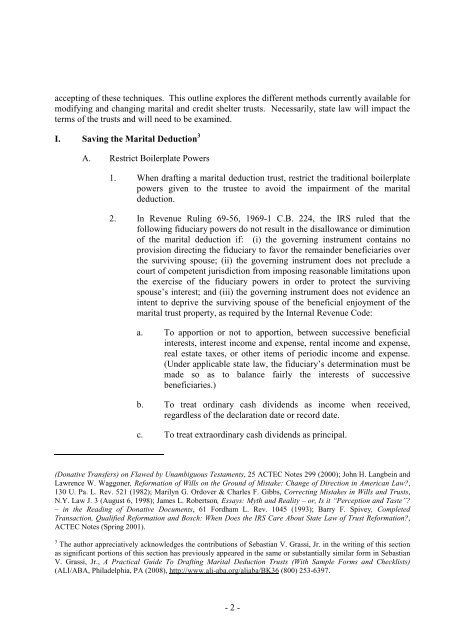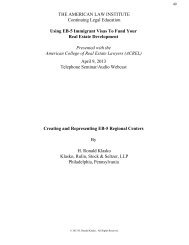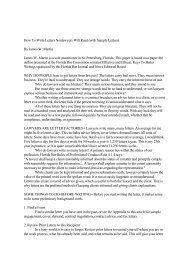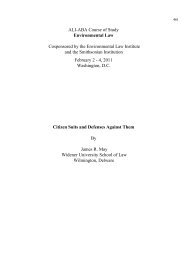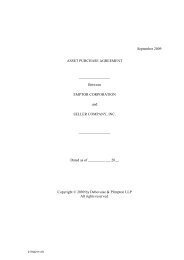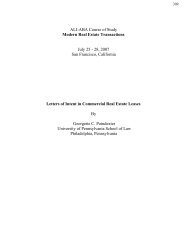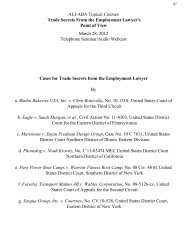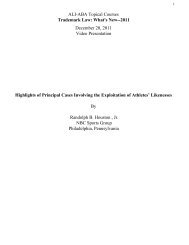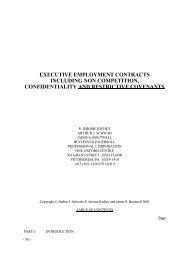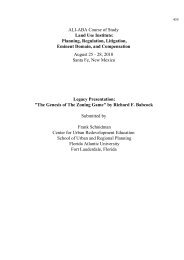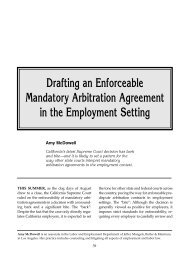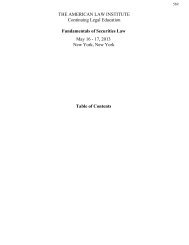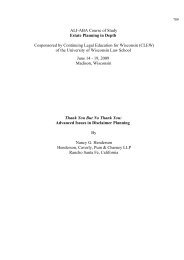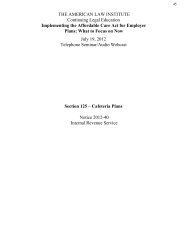fixing broken marital deduction and credit shelter trusts - ALI CLE
fixing broken marital deduction and credit shelter trusts - ALI CLE
fixing broken marital deduction and credit shelter trusts - ALI CLE
You also want an ePaper? Increase the reach of your titles
YUMPU automatically turns print PDFs into web optimized ePapers that Google loves.
accepting of these techniques. This outline explores the different methods currently available formodifying <strong>and</strong> changing <strong>marital</strong> <strong>and</strong> <strong>credit</strong> <strong>shelter</strong> <strong>trusts</strong>. Necessarily, state law will impact theterms of the <strong>trusts</strong> <strong>and</strong> will need to be examined.I. Saving the Marital Deduction 3A. Restrict Boilerplate Powers1. When drafting a <strong>marital</strong> <strong>deduction</strong> trust, restrict the traditional boilerplatepowers given to the trustee to avoid the impairment of the <strong>marital</strong><strong>deduction</strong>.2. In Revenue Ruling 69-56, 1969-1 C.B. 224, the IRS ruled that thefollowing fiduciary powers do not result in the disallowance or diminutionof the <strong>marital</strong> <strong>deduction</strong> if: (i) the governing instrument contains noprovision directing the fiduciary to favor the remainder beneficiaries overthe surviving spouse; (ii) the governing instrument does not preclude acourt of competent jurisdiction from imposing reasonable limitations uponthe exercise of the fiduciary powers in order to protect the survivingspouse’s interest; <strong>and</strong> (iii) the governing instrument does not evidence anintent to deprive the surviving spouse of the beneficial enjoyment of the<strong>marital</strong> trust property, as required by the Internal Revenue Code:a. To apportion or not to apportion, between successive beneficialinterests, interest income <strong>and</strong> expense, rental income <strong>and</strong> expense,real estate taxes, or other items of periodic income <strong>and</strong> expense.(Under applicable state law, the fiduciary’s determination must bemade so as to balance fairly the interests of successivebeneficiaries.)b. To treat ordinary cash dividends as income when received,regardless of the declaration date or record date.c. To treat extraordinary cash dividends as principal.(Donative Transfers) on Flawed by Unambiguous Testaments, 25 ACTEC Notes 299 (2000); John H. Langbein <strong>and</strong>Lawrence W. Waggoner, Reformation of Wills on the Ground of Mistake: Change of Direction in American Law?,130 U. Pa. L. Rev. 521 (1982); Marilyn G. Ordover & Charles F. Gibbs, Correcting Mistakes in Wills <strong>and</strong> Trusts,N.Y. Law J. 3 (August 6, 1998); James L. Robertson, Essays: Myth <strong>and</strong> Reality – or, Is it “Perception <strong>and</strong> Taste”?– in the Reading of Donative Documents, 61 Fordham L. Rev. 1045 (1993); Barry F. Spivey, CompletedTransaction, Qualified Reformation <strong>and</strong> Bosch: When Does the IRS Care About State Law of Trust Reformation?,ACTEC Notes (Spring 2001).3 The author appreciatively acknowledges the contributions of Sebastian V. Grassi, Jr. in the writing of this sectionas significant portions of this section has previously appeared in the same or substantially similar form in SebastianV. Grassi, Jr., A Practical Guide To Drafting Marital Deduction Trusts (With Sample Forms <strong>and</strong> Checklists)(<strong>ALI</strong>/ABA, Philadelphia, PA (2008), http://www.ali-aba.org/aliaba/BK36 (800) 253-6397.- 2 -


